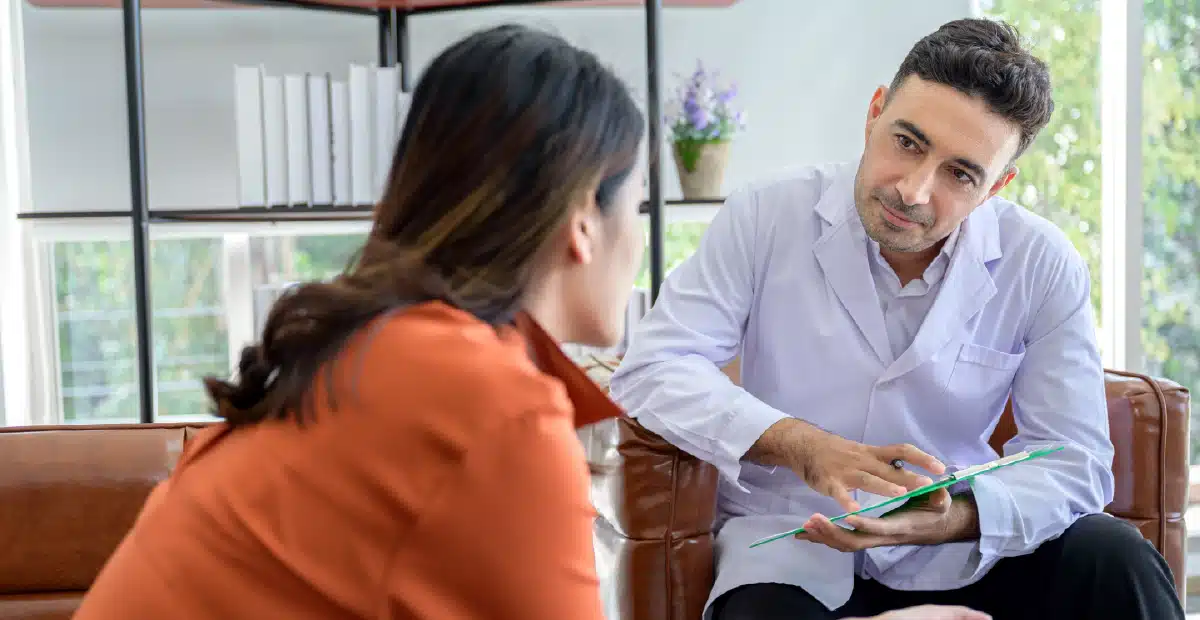Deciding to enter addiction treatment is not easy, but it is often a courageous first step towards lasting recovery. Partial Hospitalization Programs (PHP) act as a bridge between inpatient and outpatient care, helping individuals recover from substance abuse and co-occurring mental health disorders in a structured, daily treatment setting.
When enrolling in any sort of program, whether PHP, residential, or outpatient, it’s important to feel confident that the treatment program meets your individual recovery needs.
There are a few factors to look for when choosing the right PHP provider.
Some of these are general, across-the-board things to look for, such as licenses and accreditations, whether they accept insurance, and therapies offered. Some are unique to Orange County, such as keeping in mind transportation restrictions and connections to local recovery resources. Read on to understand how to choose the right PHP provider and what to look for in a treatment program in the Southern California region.
What Is PHP? How Does It Differ from Other Levels of Care?
A partial hospitalization program (PHP) is an intensive treatment program for substance abuse and co-occurring mental health disorders. Patients participate in daily individual therapy, group therapy, medication management, and holistic activities.
Unlike residential treatment, those in a PHP program often return home in the evening rather than living 24/7 at the facility. But sometimes PHP programs are structured as an extension of residential, where individuals continue living at the health center.
PHP is more structured than an IOP. While IOPs only meet a few times a week for a few hours at a time, PHPs meet daily and often for the entire day (6 to 8 hours) before individuals return home.
Factors to Look For in Quality PHP Providers
Choosing a PHP is an important decision that can impact your long-term recovery and overall well-being. Although it can feel overwhelming, we have outlined a few factors to look for when deciding on an effective PHP program.
Focuses and Specialities
Not all PHP programs treat the same substance abuse disorders or provide dual diagnosis treatment. For example, some PHP programs do not offer treatment for opioids like heroin or fentanyl, while other programs are explicitly focused on opioid-use disorders.
Some PHP programs follow a rigid 12-step approach, focusing strictly on the substance abuse disorder. And others offer integrated dual diagnosis treatment to address underlying mental health problems that drive addiction.
A Range of Therapy Options
Most PHPs offer a blend of individual therapies, group therapy, and family counseling. Many of these are supported by research as an effective treatment for substance abuse and co-occurring mental health problems. Effective therapies used in recovery include:
- Cognitive Behavioral Therapy (CBT)
- Dialectical Behavior Therapy (DBT)
- Eye Movement Desensitization and Reprocessing (EMDR)
- Trauma Therapy
- Art Therapy
- Experiential Therapy
- Group Therapy
- Family Therapy
Specialized Programs
Comprehensive addiction treatment programs offer specialized tracks focusing on unique needs or challenges for individuals from certain demographic groups or backgrounds.
Specialized programs may include:
- Veterans Track
- Faith-Based Recovery
- Recovery Program for Musicians
- LGBTQ+ focused
- Spanish Speaking Treatment
Staff Ratios and Clinic Credentials
To ensure you receive personalized, comprehensive, up-to-date treatment, it’s important to check the center’s staff-to-client ratios and credentials. Treatment centers with high to low staff-to-client ratios can spend more time with each patient and ensure recovery solutions are designed to meet your individual needs.
Also, the center’s program must have a state license and be accredited for addiction and/or mental health treatment. This information is usually available on the website, or you can directly ask admissions when inquiring for information. Some licenses and accreditations to look for include The Joint Commission, LegitScript, NAMI, and SAMHSA.
Insurance and Payment Plans
Most programs have admission teams available 24/7 to support patients in verifying insurance and enrolling you or a loved one into treatment. If your insurance is not accepted, many programs will work with your provider or create an individualized payment plan based on your financial needs.
Northbound Treatment accepts most major insurance plans. Our goal is to ensure that finances aren’t a barrier to anyone looking to access drug and alcohol treatment. Some of the major insurance providers we work with include Aetna, Cigna, TriCare (veteran healthcare), and BlueCross BlueShield.
Aftercare and Transition Services
Aftercare is essential to smoothly move through the process from a higher level into a lower level of care: residential treatment→PHP→IOP. Aftercare services help you gradually transition back to independence and daily life.
Some of the aftercare services to look for in a PHP include:
- 12-Step Meetings
- Work Exchange Programs
- Sober Living
- Relapse Prevention Groups
- Case Management
- Outpatient Care
Orange County Specific Considerations
With over 23 million residents, Southern California has hundreds of treatment programs for substance abuse and mental health recovery to choose from. However, not all of these are reliable or accessible. There are a couple of specifics to keep in mind when choosing a PHP provider, specifically in the Orange County region.
Navigating Traffic and Transit for Consistent Attendance
The Los Angeles Times reports that Orange County has some of the worst traffic congestion in the US, especially during rush hour. Unfortunately, traffic can’t be avoided, but we offer over 10 locations throughout the SoCal region to lower commute times and make treatment accessible.
Our admissions team can help you ensure reliable transit and provide you with tips on maintaining consistent treatment attendance, such as learning how to find the most affordable and easiest route to get to your treatment location. Options may include public transportation such as bus, metro, or rideshares such as Uber, Lyft, or Curb.
Local Recovery Community Connections
An important part of long-term recovery is having a reliable support system, such as family, friends, peers, and other alumni who graduated from treatment. Orange County has several opportunities to connect with others through peer support networks such as NA, AA, and other local support groups. Individuals can connect with recovery resources through the alumni program of the treatment center they attended, churches or other centers of faith, hospitals, and local community centers.
Northbound Treatment understands that the healing journey doesn’t just end after treatment. Our alumni programs ensure opportunities to stay connected and attend sober events—all of which can prevent relapse. Northbound currently has 500 clean and sober active former residents and clients in our Orange County, California Alumni Association.
PHP For Substance Abuse and Co-Occurring Mental Health Disorders in Orange County
For more than 30 years, Northbound Treatment Center in Southern California has been at the forefront of providing lifesaving, compassionate care, and specialized services to help people from all walks of life feel better, discover themselves, and live free from addiction.
We have facilities throughout California. Reach out to our admissions team now.
Author
-

President, CEO & Founder at Northbound Treatment Network
Paul Alexander is the CEO, President & Founder of Northbound Treatment Network in Newport Beach, California. He believes wholeheartedly in transformational leadership, organizational health and effective, fully integrated substance use disorder and mental health treatment. With over 27 years of experience in behavioral healthcare, Paul has extensive knowledge of “in vivo” treatment modalities, clinical development, operations, strategy, marketing and financial planning. He has been widely recognized for his development of collegiate-based residential treatment programs for students in recovery and authored a research study at The University of California confirming this modality’s effectiveness.
Paul’s comprehensive professional experience, willingness to innovate, and emphasis on organizational health are vital factors in Northbound’s continued success. Paul received his Certified Addiction Treatment Specialist training at Saddleback College in Mission Viejo, CA, and was awarded Outstanding Alumni Service Award in 2002. Paul holds a Bachelor of Arts degree in Criminology, Law and Society, Summa Cum Laude, from University of California, Irvine, and a Juris Doctorate degree from Loyola Law School of Los Angeles. Paul currently serves on The National Association of Addiction Treatment Providers (NAATP) board. In addition, he serves on The Family Recovery Foundation board and The CarePossible board in Orange County; both organizations are committed to raising funds for family recovery and treatment for former military personnel. Paul is in recovery himself and lives in Orange County with his wife Silvana and his two young sons, Noah and Dean.










